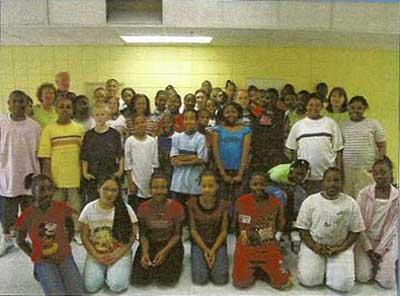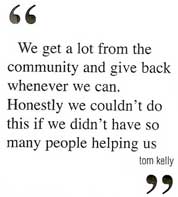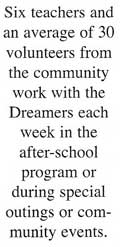
Each kindergarten teacher suggested 10 to 15 students who they felt would benefit from the program and by the time these 54 students started the first grade, they were Dreamers.
With the goal of helping the Dreamers "become productive citizens who feel good about themselves, pursue a wide variety of careers and interests and become leaders in our community, our state and our country, the initiative includes an after-school program designed at addressing the "whole child," community service projects, tutoring, summer programs, field trips and much more.
 To coordinate this massive undertaking, the Kellys chose then second-grade teacher Beth Thomas to be the project director for the Dreamers.
"She's the heart and brains of the operation," said Tom. She's been with us since day one and you just can't ask for anyone more organized or more dedicated."
To coordinate this massive undertaking, the Kellys chose then second-grade teacher Beth Thomas to be the project director for the Dreamers.
"She's the heart and brains of the operation," said Tom. She's been with us since day one and you just can't ask for anyone more organized or more dedicated."
Thomas said her work with the Kellys has defined the word "partnership." Where she brings her educational experience to the table, they bring their business sense, and while she's able to see things from a life-long resident's view, they are able to bring in an outside perspective. Their successful partnership helps all involved focus on what's most important to everyone - individual attention for each of the Dreamers.
"The most rewarding aspect of the program is the relationships with the individual kids, the difference that it make:- in their lives and the impact that it has on their future - not just their future, but their present, said Thomas. "Even though it's a fairly big program, it still allows for individuality."
It's this individual attention and accountability that the Kellys believe has helped the Dreamers become such a success. "We're continually asking one-on-one, what they're doing. getting to know them and giving them constant attention," said Tom. "'We're always talking to them about what they need to focus on to get where they want to be."
Kathy said all of the Dreamers have written their own mission statements expressing what they want to be, but more importantly, what they're doing now to get there and what they will need altogether to get where they need to go. "We feel these kids need to understand when they say. '1 want to be a lawyer, what does that mean? said Kathy.
With this concept in mind, the Kellys are adamant about educating the whole child. "We've always taught and still do teach the whole child," said Tom, not just academics, but confidence, giving back, respect. We really push that all the time - look people in the eye, you're as good as everybody else."
Six teachers and an average of 30 volunteers from the community work with the Dreamers each week in the after-school program or during special outings or community events. To date. the Dreamers have been on more than 50 field trips to museums, shelters, colleges and even a three-day space camp in Alabama. Volunteers lend their various talents to teach stamp collecting, poetry, fishing, golf, tennis, life skills, hygiene, drug awareness or are simply on-hand for help with homework. A Dreamers chorus visits nursing homes, the group painted a mural with the Steffen Thomas Museum in Buckhead and some maintain correspondence with homebound residents and work with Meals on Wheels. Community activism is evident by the group's many appearances throughout the area.
Each Dreamer's experiences are rooted in education - every action is turned into a learning experience. "If we take them to see 'The Lion King,' we talk to them ahead of time about all the things they can do - become actors, lighting, choreography - and then we de-brief on the way back:' said Tom. Each Dreamer's experiences are rooted in education - every action is turned into a learning experience. "If we take them to see 'The Lion King,' we talk to them ahead of time about all the things they can do - become actors, lighting, choreography - and then we de-brief on the way back:' said Tom.
We're taking four girls to our condo in Florida for Memorial Day weekend," said Kathy. "On a trip like that, the first thing we do when they get in the car is hand them a map and show them where we are and where we're going. Everything is a learning experience, but we try to make it fun." Even when the Dreamers are taken to a country club for their birthday dinner, the lessons they've learned in manners and etiquette are put into practice.
The Dreamers earn these trips and rewards through separate report cards based on grades, attendance, behavior and effort. Those that succeed in any of those four areas are rewarded with special trips or activities. "At first we took everyone to the movies, dinner. museums:' said Tom. "But at the end of the first year, we realized as the kids got older, they had to learn how to earn things and that's been an important lesson for them." Tom said it was a tough transition when he had to tell the group that only seven were going to see "Spiderman:' But after a few tears and after explaining to them that they had to improve in at least one of these four areas, they had to get a bus for the next outing.
"The kids are great and they're all so different, said Tom. "They all have different abilities and we just try to get them to be the best they can be based on those abilities.
Realization of a dream
 Now in its sixth year of operation, the Dreamers has quantifiable evidence to prove the success of their program. All 54 Dreamers have made the honor roll at least once, 98 percent met or exceeded standards on the Georgia CRCT lest in 2005 and the group's average attendance rate is 97 percent. But probably the group's biggest achievement is its ability to overcome the "Academic Achievement Gap" per independent testing.
Now in its sixth year of operation, the Dreamers has quantifiable evidence to prove the success of their program. All 54 Dreamers have made the honor roll at least once, 98 percent met or exceeded standards on the Georgia CRCT lest in 2005 and the group's average attendance rate is 97 percent. But probably the group's biggest achievement is its ability to overcome the "Academic Achievement Gap" per independent testing.
Tom said that according to the research of Drs. Mike and Mary Shapiro of Athens, they have found that the test scores in science, reading and math of children from underperforming schools and single parent households at or below poverty level, will be 10 to 15 points lower than their IQ. The Shapiros came and evaluated the Dreamers for IQ and academic achievement and found that there was indeed an academic achievement gap - it just wasn't what they had expected. Tom said every one of the Dreamers had "leap frogged" over the expected academic scores and actually scored much higher than their IQs, something he said the Shapiros had not seen in their combined 40 years experience in childhood psychology.
"Every now and then, you go home and say, 'Is this making a difference?" I think that answers my question," said Tom.
Keeping the dream alive
In 1981, "60 Minutes" did a segment on Eugene Lang who began the national "I Have A Dream" foundation. In 2004. the show did a segment on the Greensboro Dreamers.
Tom said "'60 Minutes" wanted to revisit the program as it had spread to more than 100 programs across the country. "They interviewed on the phone more than 50 'I Have A Dreams' around the country," said Tom. "They narrowed it down to 25, visited 20, came back again for 10, filmed extensively for five and only used us, so we're very proud of that."
The Greensboro Dreamers have also been featured in People Magazine, Time Magazine and recognized by Gov. Perdue and Tom's alma mater, Villanova University.
Tom asked the producers of "60 Minutes" why they settled on his program and the answer, among other things, had to do with the amount of volunteers dedicated to the program. An average of 30 volunteers a week spend their afternoons, weekends and holidays with the Greensboro Dreamers. "We've learned how to use the volunteers by listening," said Tom. "We don't say, 'Here's what we want you to do.' We say. 'What do you want to do?' Some want to tutor, some take them fishing and some just read to the kids. We'll mix and match whatever they want to do."
Tom said "60 Minutes" couldn't believe the number of volunteers, but to Tom and other lake residents, the volume of support doesn't come as much of a surprise. "One thing that's really and truly impressive about Greene County is the number of volunteers, not just with us, but with organizations all over the county," said Tom. "There are just so many different people that give their time and their money. It's just amazing."
It's these volunteers that Tom depends on to keep his program alive. With operational costs of $250.000 a year, he spends hours each day finding financial support for the Greensboro Dreamers" With private donors from 27 different states, five different fundraisers throughout the year and state contracts and federal grants, he is able to pay operating costs, the director, the teachers, transportation, food and supplies and still puts the majority of the money away for college in separate funds that cannot be touched other than for post-secondary education. The organization has no administrative costs and all donations are tax-deductible. "When we first started, that was our big point - we weren't in this to get anything out of it." said Kathy. "We don't take a dime. In fact we and the volunteers contribute a lot ourselves."
Though most of their "retirement" is dedicated to the Dreamers, the Kellys find time for their family and do a fair amount of traveling. "Between the Dreamers, we are very much into our family," said Kathy. "So that pretty much eats up our time. We spend as much as we can with our grandchildren." Tom even found time to play a little golf last year. His newest initiative is to work closely with an employment and employability task force in Greene County, designed to get residents "work place ready" and encourage employers to look within Greene County for employees.
"Our focus is the dreamers, but we try to go beyond our 54 kids," said Tom. "We get a lot from the community and give back whenever we can. Honestly we couldn't do this if we didn't have so many people helping us - school system, different volunteers, cooperation at different levels. We're truly blessed. We definitely are in the right town."